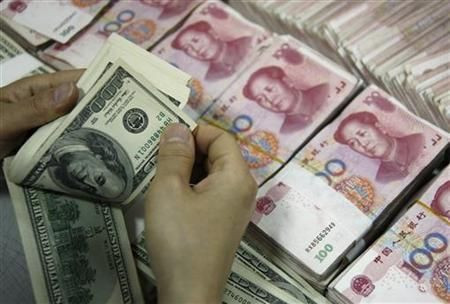World’s 10 Biggest Companies By Market Cap: US Companies Top The List; No Chinese Companies In The Group

Chinese companies are no longer on top of the world.
For the first time since 2006, Chinese companies have dropped out of the ranks of the world’s 10 biggest stocks by market value, Bloomberg reports. Back then, as many as five Chinese companies made the cut. Today, all 10 spots belong to U.S. companies.
The new lineup is Exxon Mobil Corporation (NYSE: XOM), Apple Inc. (Nasdaq: AAPL), Google Inc (Nasdaq: GOOG), Microsoft Corporation (Nasdaq: MSFT), Berkshire Hathaway Inc. (NYSE: BRK.B), Wal-Mart Stores, Inc. (NYSE: WMT), Johnson & Johnson (NYSE: JNJ), General Electric Company (NYSE: GE), Chevron Corporation (NYSE: CVX) and Wells Fargo & Co (NYSE: WFC).
At the peak of the stock market bubble in October 2007, Chinese state-owned enterprises PetroChina Company Limited (HKG: 0857), China Mobile Ltd. (HKG: 0941), China Petroleum & Chemical Corp (HKG: 0386), China Construction Bank Corporation (HKG: 0939) and China Mobile Ltd. (HKG: 0941) were all included in the list.
Since then, a couple of factors have changed the landscape. A natural slowdown in China’s economic growth rate, a government-orchestrated tightening approach in China and the biggest U.S. stock rally in a decade all contributed to the change in the rankings.
Since taking office in mid-March, Premier Li Keqiang's government has taken a different policy path from that of its predecessor. Its key economic policy framework, which Barclays Capital summarizes as “Likonomics,” consists of three key pillars – no stimulus, deleveraging and structural reform.
The bank says: "During the past three months, the new government has resisted repeated calls for new stimulus because it believes state-led investment is no longer sustainable. Instead, the authorities are making efforts to control financial risks, especially the flow of credit that could be fueling asset bubbles."
The Shanghai interbank overnight rate (Shibor) shot past 10 percent on June 20, compared with its normal level of close to 2 percent. But the Chinese central bank had no intention to give the markets what they wanted. The signal was clear: It’s time to let some air out of the bubble.
Monday, June 24, marked the 100th day of the Li Keqiang government. The markets, however, were in no mood for celebration. The Shanghai A-share Index dropped below the 2,000 level that day with about 1.34 trillion yuan ($217.9 billion) of market capitalization evaporating in the blink of an eye.
PetroChina, the state-owned oil producer that was the world’s sixth-largest company in May, lost $35 billion in market value this month to $214 billion, dropping to 12th, according to data compiled by Bloomberg. PetroChina is the last Chinese company to be ousted from the top 10.
© Copyright IBTimes 2024. All rights reserved.






















